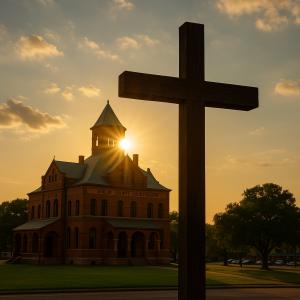Jerry Lewis of Center, Texas — Worship, Forgiveness, and the Authority of God’s Word
Exploring worship beyond tradition—Jerry Lewis of Center, TX emphasizes obedience, forgiveness, and the Word as life’s foundation.
Bitterness chains us to the offender, but forgiveness frees us to worship God fully.”
CENTER, TX, UNITED STATES, August 27, 2025 /EINPresswire.com/ -- Across America, Sunday mornings look familiar: pews filling, guitars tuning, bulletins folded neatly on chairs. Yet behind the familiar rhythms, a deeper question hums beneath the surface: Do we really know what worship is? In an era when churches argue over styles, traditions, and trends, Jerry Lewis insists the heart of worship has little to do with preference and everything to do with authority, obedience, and forgiveness. His reflections cut through the noise, calling families and congregations back to the foundation of God’s Word and the transforming presence of Christ.— Jerry Lewis
________________________________________
Four Bases of Authority
“Every belief we hold about worship comes from somewhere,” Lewis says. “It’s rooted in one of four things: the Word of God, history and tradition, human intellect, or personal experience. And while all four matter, only one is final, God’s Word.”
He chuckles, recalling a story. “Think about why so many Southern churches started service at eleven o’clock. Farmers had to milk cows, feed stock, hitch wagons. By the time they arrived, it was late morning. That became tradition. But Scripture never said worship begins at 11. Tradition can shape us, but only the Word is our anchor.”
Wrestling With Worship
Lewis opens to Isaiah 6, painting the scene like a storyteller:
The King on the throne. Seraphim crying Holy, holy, holy. The prophet undone by his own sin. A coal pressed to unclean lips. A forgiven man hearing God’s call: Whom shall I send? And a faithful reply: Here am I. Send me.
“That,” Lewis says, “is worship. God takes the initiative. He reveals Himself. We see our sin. We confess. He forgives. And then we respond in obedience.”
________________________________________
“Clean hands are right actions. Pure hearts are right motives. No idols means nothing between you and God.”
________________________________________
Preparing the Heart
Lewis insists worship begins long before the first chord. “Psalm 24 asks, Who may ascend the mountain of the Lord? The answer: those with clean hands, pure hearts, no idols. That’s preparation. And you don’t start it in the pew, you start it in the car, confessing, thanking, praising. By the time your feet hit the parking lot, your heart ought to already be looking up.”
Psalm 100, he adds, gives the same rhythm: “Thanksgiving is for what God has done. Praise is for who He is. Worship’s not just noise, it’s recognition.”
________________________________________
The Cost of Worship
Turning to Hebrews 13:15, Lewis speaks with gravity. “In Israel, everyone brought an offering rich or poor. It had to be the best. And it was for God’s glory, not theirs. Worship today is no different. It’s commanded. It requires our best. And it’s only for Him.”
________________________________________
Forgiveness Before the Song
Here his tone refines. “Worship is in vain if we refuse to forgive or to seek forgiveness,” he warns. Quoting Matthew 5, he says, “Leave your gift at the altar. First be reconciled.”
Forgiveness, Lewis explains, is not forgetting or excusing, it is releasing the right to get even into God’s hands. Reconciliation, however, requires confession, repentance, and change. Both are the soil of true worship.
“It may not feel fair,” he admits. “If someone offends me, I must forgive. If I offend someone, I must go ask forgiveness. But that’s the way of Christ. Because worship matters that much to God. When we refuse to forgive, we render ourselves incapable of worship.”
________________________________________
“Bitterness shifts our focus from God to the person. As long as we refuse to forgive, we are chained to the offender. Forgiveness frees us from the bondage of bitterness, so that we can focus on God.”
________________________________________
Worship That Lasts
For Lewis, the definition is simple but weighty:
“Biblical worship is the obedient response to God’s revealed nature and character.”
It’s not about style or preference, he says. It’s about God, who He is, what He’s done, and our obedience in response.
Lewis’ words linger long after the conversation ends. Worship, he reminds us, isn’t just a Sunday routine or a fleeting emotion, it’s the very heartbeat of a life surrendered to God. “Every song, every prayer, every step of obedience,” he says.
The invitation, then, is simple but profound: to enter each day with clean hands, pure hearts, and nothing between us and the God who calls us His own. Worship is not confined to sanctuaries or schedules; it is lived out in forgiveness, in reconciliation, in obedience, and in love.
As Lewis puts it, “The King is worthy. And when we worship Him, not just with our lips, but with our lives, we discover the nearness of God that no distraction in this world can take away.”
Ellis Ward
Unity Press
E.Ward@unitypress.press
Visit us on social media:
YouTube
Legal Disclaimer:
EIN Presswire provides this news content "as is" without warranty of any kind. We do not accept any responsibility or liability for the accuracy, content, images, videos, licenses, completeness, legality, or reliability of the information contained in this article. If you have any complaints or copyright issues related to this article, kindly contact the author above.

